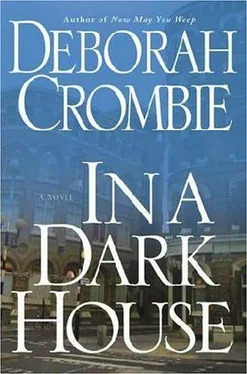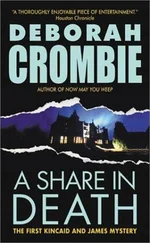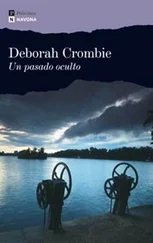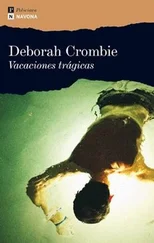But he hadn’t wanted to let the old place go. It was part of Bankside, part of who he was, part of what he believed in. And trying to make him into a country gentleman was about as ridiculous as putting a pig in a tutu.
After what had happened last night, however, selling up might be his only option. How else could he get his hands on the cash he needed, and get it quickly enough?
A current of fear snaked between his shoulder blades and he clenched his fists, as if he could physically subdue it. He’d always considered himself tough, a self-made man who could tackle anything that came his way, but the thought of the charred remains of his warehouse, and of the body he’d seen loaded into the mortuary van, made him feel sick.
Had the fire been a warning, the body a reminder of what could happen to his daughter if he didn’t ante up?
He strode to the sideboard and poured himself a tumbler of whisky from the bottle he kept mostly for guests. He’d never been much of a drinker, on the theory that it took a clear head to get on in the world, but tonight he needed something to numb the worry clutching at his gut like a claw.
Did Chloe have any idea what she’d got herself into? Or did she think she could wheedle her way out of this, as she had everything else in her life?
The girl had always preferred her mother’s company – not that he’d given her much choice, with his schedule – but when her mother had taken off with that ponce of a designer, Chloe had chosen to stay in London with him. She’d been eighteen then, and she’d thought exile to a seaside town like Brighton a fate worse than death.
But nothing Yarwood had done in his life had prepared him for dealing single-handedly with a spoiled and angry teenager, and he’d failed miserably. He’d insisted she get a job or stay enrolled in some sort of college or university course, but she didn’t seem able to stay with anything long enough to make a success of it. After two years of her failures, his patience at an end, he’d told Chloe he’d no intention of continuing to support a layabout, and he’d kicked her out.
He hadn’t counted on Tia Foster taking her in as a charity case. Tia, whose wealthy parents had endowed her with more money than sense, had moved Chloe into the spare bedroom in her flat, and Chloe managed to survive by scrounging off Tia and begging the occasional handout from her mother.
Christ, how could he not have seen how vulnerable his daughter was? Or how vulnerable she had made him?
Now he could do nothing but pay for the consequences of his own stupidity, and try to keep Chloe safe. He picked up the phone and jabbed a blunt finger at the keypad once more.
He knew the value of a uniform. Clothes made the man. Or so his mum had always told him – the old cow – and then she’d reinforced the maxim with a few well-placed smacks. It had been years since he’d had to put up with that, but he still ironed his shirts as if his mother were watching over his shoulder.
Collar first, then shoulder, then sleeves. He slipped a fresh section of pale blue cloth over the end of the board and shot it with spray starch. His routine never varied. Every evening before reporting for work, he unfolded the old ironing board in the middle of his sitting room and labored over his uniform shirt until it could stand on its own; then he touched up his navy-blue trousers and jacket.
Radio Two droned in the background, not quite loudly enough to cover the murmur of traffic that drifted up from Blackfriars Road through his partially open window. His mum had been big on fresh air in all weather, convinced that sealing up a dwelling would result in a buildup of deadly gases. Bollocks, of course, he knew that, but still the habit stayed with him, and he liked the way the smell of curry from the takeaway beneath his flat mingled with the exhaust fumes and the clean soapiness of the starch.
It was odd the way the mind could divide itself, one part occupied with the identifying of familiar scents, the motion of his arm holding the iron, the babble of sound from the radio – while the other part seethed and bubbled with excitement from last night’s burn.
It had been – what was the word he’d read somewhere? – serendipitous, that was it. The walk home after his half shift, the sliver of darkness beckoning him from the open door, the interior prepared for him as if by some grand design.
Could it be that his own carefully prepared plan fit into something larger, dovetailed within it like a nut inside its shell? The thought was so heady it made him shiver. “Careful, careful,” he whispered, his voice a thread of sound in the empty room.
The possibilities were laid out in his mind like a series of jewels on a map of the Borough, all carefully researched and explored, waiting to be plucked when the time seemed right. Did last night’s gift mean he should act sooner than he’d planned?
Anticipation pumped his heart, made the breath puff from his nostrils. He whipped his shirt from the board and switched off the iron – no one knew better than he the dangers of fire – his mind alight with the thrill of choice.
“That was a frigging waste of time,” Maura Bell muttered as she walked out of the fire station into Sawyer Street, Kincaid and Cullen on either side of her. The rain had stopped at last, and above them a few patches of dusky purple sky showed against the banks of pewter cloud. The temperature had dropped with the sunset. Glancing back, she saw warm light spilling from the windows in the fire station’s red bay doors, a glimpse of a closed and comforting world.
She shrugged the collar of her coat closer around her throat.
Kincaid glanced at her, raising an eyebrow, as Cullen said easily, “Maybe, maybe not,” as if he’d nothing better to do than sit around watching a bunch of surly firefighters shuffle their feet and look clueless. “Somebody may remember something. Never hurts to plant a seed. Listen,” Cullen added as they reached his car, left in the fire station car park, “we’ll give you a lift back to the nick. There’s not much more we can do tonight.”
“I’ve a better idea,” Kincaid said. “Why don’t we all have a drink. My treat. We can map out our agenda for tomorrow.”
Her response was automatic, instinctive. The last thing she wanted to do was have a chummy pint with Scotland Yard. “I’ve things to do at the station.”
“Surely they can wait a bit,” Kincaid said lightly. “Call it conference time, if it will ease your guilty conscience, but I think we could all use a break.”
“The CCTV films-”
“That’s what constables are for,” chimed in Cullen, opening the car’s back door for her. “You have to learn to delegate.”
Maura shifted some of the papers that had slid back into the space she’d cleared in Cullen’s backseat on the short ride from Southwark Street to the fire station. The task gave her a moment to think.
She’d checked in with the incident room staff just before their meeting at the fire station, so she knew there were no breaking developments that urgently needed her attention.
She was also aware that her refusal to socialize with the other detectives could mark her as a bad sport, and possibly a prig – not the reputation she wanted to establish on her first outing with Scotland Yard. “Okay, just a quick one, then,” she said, trying to give in gracefully. “I know a good pub in Borough High Street. Or there’s this one.” She pointed at the pub that occupied the bottom corner of the fire station premises. “The Goldsmith-”
“If I’m buying, I get to choose,” interrupted Kincaid, sounding amused. He glanced at Cullen. “The society?”
Cullen nodded. “Right.”
Читать дальше












